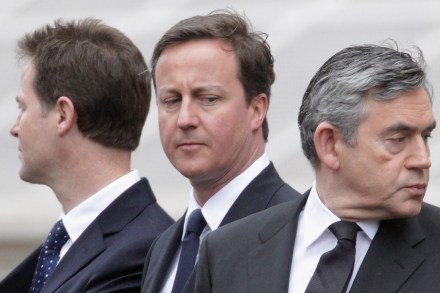Swords around a throne
The Sunday Times reports that the Cabinet is suggesting to Gordon Brown that he resign as Prime Minister, and that Labour goes into opposition against a weak Conservative government facing an unenviable economic task. The ‘Caretaker Prime Minister’ did not fly to Scotland to consider a re-shuffle, though that would have provided some light entertainment. And his swift return to London this afternoon suggests that Brown’s premiership is gasping its dying breaths. With the exception of a brief lapse on the telephone, Brown’s conduct has been dignified in recent days. For once, he has led. Will he remain as Labour leader if he resigns as PM? He might; he’s stubborn













